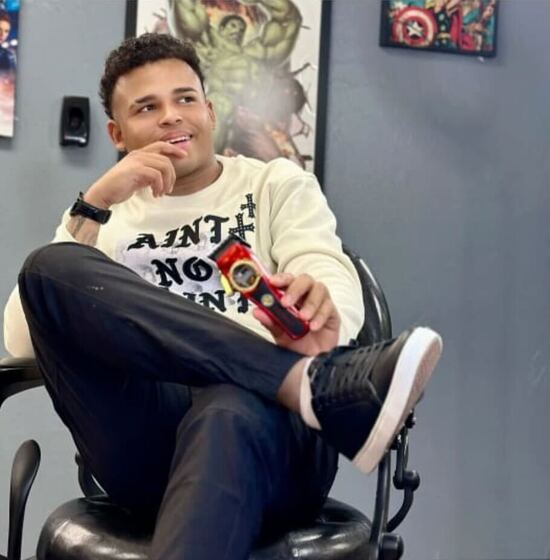Mirelys Casique’s line went quiet before the sound of stifled tears filled the speaker.
“We are the faces of the victims, of this pain,” she told Daily Kos from her temporary living quarters in Geneva, Switzerland.
Casique, along with four other Venezuelan parents, is currently seeking justice for her detained son. This was the only reprieve she had between endless days of knocking on doors and attending meetings at what Casique described as the United Nations’ “palace.”

“I don’t have the finest clothes, and I’m not very well-spoken. I don’t have a great profession, but that doesn’t mean I don’t have rights,” she told Daily Kos. “However, there have been many people here who have shown empathy, who have taken the time to investigate our children. They will do everything they can, but honestly, we haven’t received what we hoped for.”
Nearly two weeks prior, Casique and the other parents flew to Geneva in hope of getting the United Nations to intervene in President Donald Trump’s detainment of more than 250 Venezuelan men in El Salvador’s notoriously violent prison, CECOT.
“Of course, we are secondary victims, but we are victims because we are mothers, fathers, families that have been devastated. And, oh my God, how hard it has been to defend the innocent,” she told Daily Kos.
Casique is working on behalf of her 24-year-old son, Francisco Garcia Casique, who—while working as a barber in Texas as he attended mandatory immigration court hearings—was violently abducted by ICE in the middle of the night and later shackled and flown to CECOT.
Francisco, like many of the other detainees, has so far only been accused of being a Tren de Aragua gang member because of his tattoos. And while U.S. judges and the Supreme Court have attempted to intervene, men like Francisco still sit behind bars without a chance to prove their innocence.
Now Casique joins Karlyn Fuentes, Jetzy Arteaga, and two other parents in Geneva, though the lack of communication has made it difficult to know whether their sons—Francisco, Joen Suarez, and Carlos Alejandro Cañizales—are alive.

“I still couldn’t even say for sure that my son is there,” Fuentes, the mother of 23-year-old Suarez, told Daily Kos.
Soon after discovering their sons’ names on the deportation flight list, these parents formed what they now call Committee for the Defense of the 252 Venezuelans Kidnapped in El Salvador. As of late June, more than 100 parents have joined the committee.
“We are a family of struggle—sisters in struggle—and we are always there for one another,” Artaega, the mother of Cañizales, said. “When one is in depression, the other is there. When one is calm, the other is crying. You don’t sleep. You don’t eat.”
The only person who can officially condemn human rights violations at the international level is the U.N. High Commissioner for Human Rights Volker Türk.
While Türk has called for the United States to carry out due process, the Venezuelan parents of those who have been detained present a unique challenge: Venezuelan President Nicolás Maduro has a record of extreme human rights violations of his own.
In the past year, Maduro has been under fire for blatantly stealing an election from his challenger and imprisoning the opposition. The now third-time elected president also imprisoned a group of economists who reported data on the country’s declining economy.
On the outside, it may not seem fair to cast blame on these parents for the actions of their government. But as professor and Latin American political affairs expert David Smilde told Daily Kos, that’s unfortunately the way that it is.

“Nobody wants to listen to Maduro. [The U.N.] is really limited in what it can actually do with this because they’re such a stigmatized government,” Smilde said.
This may be why, when speaking with Daily Kos, the parents distanced themselves from their government, focusing instead on the heartwrenching stories of their abducted children.
The parents told Daily Kos that their trip to Geneva was funded by non-governmental organizations, but a source who asked to remain anonymous due to their proximity to the case said that funding came, in some capacity, from Maduro’s pocket—potentially making their association with the Venezuelan government hard to ignore.
But Casique told Daily Kos that she’s not there to atone for the actions of her government.
“What fault do we have for the political and diplomatic problems happening?” she asked. “How long will we have to keep suffering?”
Related | Freeing Widmer: An aunt’s journey to El Salvador’s notorious CECOT prison
While the fate of their sons remains to be seen, these parents vow to continue holding each other up—for the sake of their children.
“One day you spend the entire day crying, praying to God. And the next day you tell yourself, ‘I have to get up,’” Fuentes told Daily Kos. “Because if I stay trapped in bed, there is no one to raise their voice for my son.”
Freelance journalist Juan Diego Ramirez contributed to this reporting.
